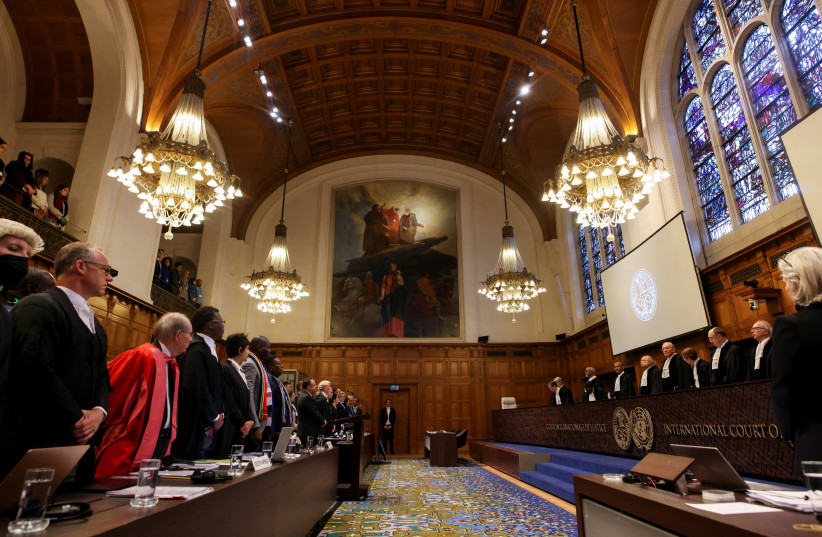South Africa does not excel, to say the least, on fighting corruption or on efficiently managing public institutions, which is perhaps why Israel did not see it coming. True, since the beginning of the ground offensive in Gaza, IDF advanced with legal counseling at its side every step of the way. Having said that, it is clear now that Israel arrived to the International Court of Justice in the Hague not enough prepared.
By not enough prepared, I don’t mean that the Israeli legal team didn’t do its homework. On the contrary. Under the circumstances, it actually did remarkably well. The six Israeli legal experts stayed calm, focused, and clear in their arguments.
Time was calculated to the very last minute, to bring up to the court’s attention every detail that could strengthen the Israeli viewpoint. The most powerful parts were probably the opening remarks by Tal Becker and the presentation by Galit Raguan about facts on the ground, laying it out to the court why Israel cannot be suspected on genocidal intention.
The thing is, that the problem goes much deeper. It relates to irresponsible statements issued since Oct. 7 by Israeli politicians, to videos and pictures filmed by soldiers inside the Gaza Strip, and to missed warning signs that South Africa was up to something.
The Israeli legal team explained that most of the statements presented by South Africa came from people who are not decision-makers, that the quotes from Prime Minister Benjamin Netanyahu and from Defense Minister Yoav Gallant were taken out of context.

They reminded the court that Netanyahu explicitly said Israel is not out to occupy Gaza, and is not fighting the Palestinians there, only Hamas. Still, the judges of the courts, all human, will probably not forget the video clip showing Israeli soldiers dancing and chanting that there is no such thing as (innocent civilians) uninvolved.
Reading the documents submitted by South Africa to the court, and watching on Thursday its eight representatives pleading in the Hague, it was obvious that Pretoria has been preparing its coup for quite a while. The leader of the South African legal team, John Dugard, concentrated on the jurisdiction of the court to discuss the case, arguing there was an ongoing dispute between the two countries over the situation in Gaza.
To prove the alleged ongoing dispute, Dugard referred to letters sent by the South African foreign ministry to Jerusalem, expressing their concerns over the humanitarian situation in the Strip and demanding to discuss it. The South African lawyer claimed that Israel never responded to these letters, hence the dispute.
Malcolm Shaw, who leads the Israeli legal team, refuted the South African jurisdiction claim, showing that Israel did respond to the letters and that it did in fact invite South Africa to open a dialogue over Gaza. Shaw said that South Africa is misleading the court by pretending otherwise.
He did not say out loud what was clear to all of us, on the Israeli side, that South Africa had sent these letters with one goal in mind, to establish the jurisdiction basis for the complaint they later filed to the International Court of Justice. He didn’t say what seemed to be obvious, that every reaction Pretoria officially issued against Israel since the ground operation was launched, was planned and premeditated, ahead of the Hague.
Unfortunately, in the world we live in, the explanations presented by Shaw might not be enough. International bodies exist to mediate between countries. A world without conflicts need not international organizations. More than that, the war in Gaza has stirred strong emotions across the globe. It is difficult to see the court backing away from the opportunity of having a say.
After two days in the Hague, it seems that the Israeli team might feel the same. Indeed, it is hard to imagine the court accepting South Africa’s allegation that Israel carried out genocidal acts, but the court can easily issue an order – a provisional measure in legal terms – for Israel to halt its military operation in Gaza. The mandate of the court enables that. One does not hinge on the other.
And there is also something else. Having witnessed the well-prepared presentation by the South African team one can only wonder what else is in store for Israel in the coming weeks.
The obvious response would be complaints against Israeli military officers and Israeli elected at the International Criminal Court, also located in the Hague, for alleged war crimes in the Gaza Strip. It might not be South Africa itself submitting such complaints, but would it really matter who will officially be behind that?
